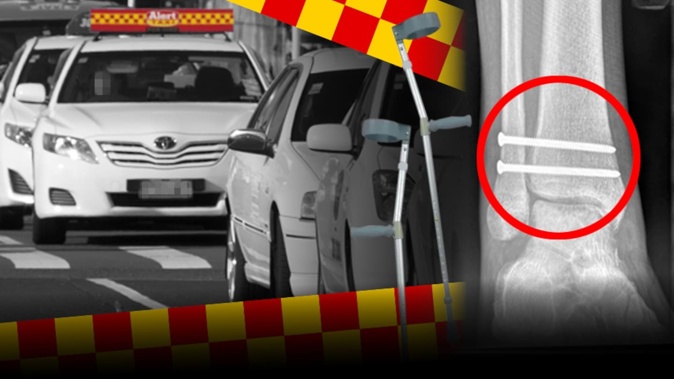
* The Accident Compensation Corporation now spends $35m a year on taxis for injured clients - as the number of complaints hits a five-year high
* A man recovering from a broken ankle was left waiting in pain in the street for more than 30 minutes for taxis that never arrived
* The largest service provider concedes it fails to arrive within five minutes of a booking nearly 10 per cent of the time - and charged ACC for a ride that never happened
ACC is facing a multi-million dollar blowout providing taxis for injured people, as complaints about the service increase.
The government organisation spent more than $35 million last year on taxi rides for recovering clients who require help to attend medical treatment or to get to work – up more than $8m on the previous year, largely due to a fare increase to cover petrol prices.
A Herald investigation can reveal that in the past five years ACC has not conducted any audit of the companies that provide taxi services. This is despite 2023 yielding a total of 230 complaints from users.
One complainant is an Auckland resident who broke his ankle and was returning to the workplace while relying on crutches and a moonboot. He was left standing in the street in pain for more than 30 minutes waiting for taxis that did not arrive.
As part of a formal complaint to ACC, he has now discovered the corporation was invoiced for one taxi ride that never happened, as he had cancelled it by phone after waiting 40 minutes. He paid for an Uber home instead.
The man, who works for the Herald, has told ACC his overall experience was the taxi service was “frankly a disgrace” and the service was completely unreliable.
“My concern is that many ACC clients are vulnerable and are recovering from significant medical events,” he told ACC.
“Many clients rely on this transport to attend medical and physio appointments – when the taxi arrives 30 minutes late they will miss these appointments and their rehab is compromised.”
The man’s complaint was lodged on March 5 but he only received a response late last week after the Herald began asking questions about his case.
ACC says it treats all complaints seriously, “truly regrets” the man’s experience and has offered to reimburse his out-of-pocket expenses.
The corporation also confirmed it was invoiced for a taxi ride that never happened and the provider has now reimbursed that money.
ACC contracts out its taxi service to four companies and says it expects vehicles to arrive within five minutes of the booked time.
However the largest provider confirmed to the Herald that they fail to meet this requirement in 9.6 per cent of bookings.
ACC figures show the service providers fielded a total of 230 complaints last year - the highest in the past five years.
The corporation says the overall increase is likely because of a rise in journeys. ACC says it is “satisfied with the integrity” of monthly reports from the taxi companies, which outline timeliness using GPS data and timestamps.
 An Auckland man who broke his ankle in a fall at home on December 13 2023 says ACC's unreliable taxi service impeded his return to the workplace. Image / Supplied
An Auckland man who broke his ankle in a fall at home on December 13 2023 says ACC's unreliable taxi service impeded his return to the workplace. Image / Supplied
‘What happens to a vulnerable elderly ACC client left in a similar situation?’
The four companies providing ACC’s taxi service are Taxi Transport Consortium, Blue Bubble, Driving Miss Daisy and Super Shuttle.
Taxi Transport Consortium, which includes Auckland’s Alert Taxis and has around 70 subcontractors, provides most of the rides and has held a contract with ACC since October 2019.
Taxi users are told to direct complaints to the company to respond to. ACC figures reveal the consortium received 217 complaints last year - easily the highest number in the past five years, but a fraction of the 257,631 trips provided.
The Auckland man, who asked not to be named, obtained the complaints and spending data using the Official Information Act. He formally complained to ACC that the consortium repeatedly failed to send taxis to journeys he booked more than 24 hours in advance.
On his first day back at his office on February 27 – 10 weeks after he broke his ankle in a fall at home – he arrived 30 minutes late due to the taxi’s late arrival.
The return ride booked for 4pm was a no-show. The consortium’s call centre said the wait would total 35 minutes so he cancelled the ride and was forced to pay for an Uber home.
“Curiously in Taxi Transport Consortium Ltd’s online portal there is no record of the fact that booking was cancelled. I would encourage you to investigate if you were invoiced for a ride that was not provided – that would be fraud,” he told ACC.
ACC has now confirmed it was invoiced for that journey, even though it never took place.
The man complained to Taxi Transport Consortium Ltd and a manager offered to place his bookings herself. But two days later he was again left standing in the street in pain when a taxi booked for 8.30pm on a Friday night never arrived. After waiting 30 minutes he cancelled the booking by phone and again paid for an Uber.
He then gave up using the service and spent $350 over the next fortnight on ride-shares to get to and from work and physio, until a surgeon cleared him to resume driving.
“It’s become obvious to me that Taxi Transport Consortium Ltd drivers resent having to do ACC jobs, presumably because it is a discounted fare,” he wrote in the complaint to ACC.
“What I do not understand in this day and age is why ACC does not have an arrangement with a ride-share service such as Uber in areas where they operate.”
That would save the government money, the man reasoned in the complaint - rides from his Onehunga home to the CBD that were charged to ACC at a fixed taxi fee of $30.87 would have cost between $21 and 23 on Uber.
He stressed he was grateful for ACC’s support in his rehabilitation, but “my concern as a taxpayer is that you are paying above market rates for a service that is frankly a disgrace based on my experience so far.
“While the provider does not know a passenger’s specific medical history, the mere fact that they are an ACC client demands an efficient and reliable service.
“My concern is what happens to a vulnerable elderly ACC client left in a similar situation, without a cellphone or who cannot afford to order an Uber to get where they need to.”
 ACC's service expectations for providers is for taxis to arrive within five minutes of the booked time.
ACC's service expectations for providers is for taxis to arrive within five minutes of the booked time.
What ACC says about oversight of taxi services
ACC expects taxis to arrive within five minutes of the booked time. But in the past five years it has not conducted a single independent audit of the taxi companies’ service. It instead relies solely on monthly reports from the companies themselves.
“All jobs are logged and measured by GPS meter logging. These logs record GPS location and timestamps of the taxi trip. A summary of these trips is reported back to ACC monthly,” the corporation stated in its OIA response.
“ACC also has the authority to audit the performance of taxi providers on request. However, ACC is satisfied with the integrity of the monthly data, and to date we have not triggered random checks on taxi performance.”
One taxi company also has feedback survey QR codes in vehicles “to allow an additional channel for feedback”, ACC stated, and it is investigating cellphone apps that will prompt riders to rate their driver. ACC also sends out general surveys.
ACC deputy chief executive for corporate and finance Stewart McRobie confirmed to the Herald that Taxi Transport Consortium had charged ACC for the February 27 ride that never took place.
“We truly regret the inconvenience and out of pocket expense to find alternative transport. We have offered a reimbursement for the costs he incurred,” McRobie said.
“Every ACC client deserves a reliable taxi service while they are recovering from an injury, however, we recognise that there is room for improvement.”
ACC paid an agreed rate to the consortium who pay their subcontractors, McRobie said, and there was a clause in the contract to ensure subcontractors were paid fairly.
Taxi Transport Consortium director Luccidessa Ford said a wrong cellphone number had been loaded in the Auckland man’s account, meaning he could not be contacted about delays. Ford also cited Auckland’s “unpredictable” traffic as a reason why taxis could be late.
It was not acceptable - and extremely rare - for a taxi to not turn up, Ford said.
The company had invoiced ACC for the February 27 ride that never happened, Ford confirmed: “A credit has been raised to ACC and a reminder of our invoicing process has been sent out to all drivers to avoid this in the future.
“There are procedures in place for the monitoring of all bookings and contact is made with the client by either the assigned driver if they believed there would be a delay, or the contact centre should a problem be identified, and a replacement vehicle is required,” Ford said.
“GPS tracking of vehicle pick-up times is registered back to the ACC portal per booking when the client comes out to the vehicle, and the driver activates the meter.”
The consortium’s contract with ACC expires on November 1 2025.
ACC says any provider, including ride-share operators such as Uber, can bid for the contract the next time it is put out to tender.
Nicholas Jones is an investigative reporter at the Herald. He won the best individual investigation and best social issues reporter categories at the 2023 Voyager Media Awards.
This article was originally posted on the NZ Herald here.
Take your Radio, Podcasts and Music with you









